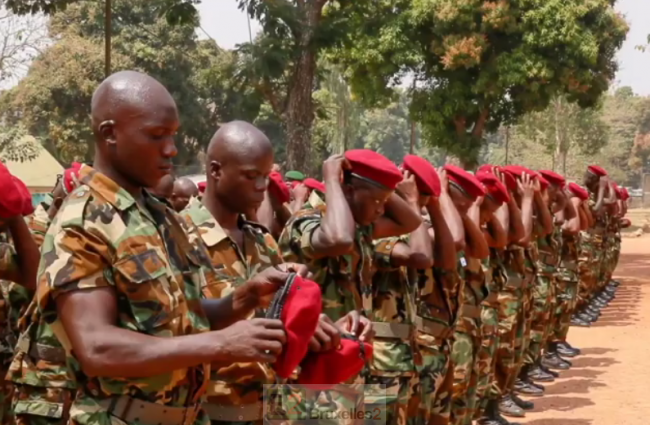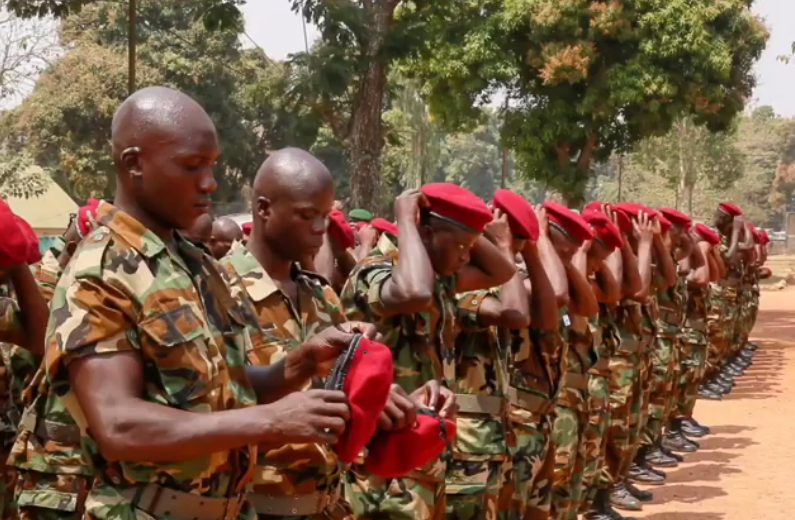Central African Republic. A first detachment of former rebels reintegrated

(B2) It is the culmination of a long work of conviction and training. A first " cohort » of around a hundred former rebels (ex Séléka, anti-balakas) were officially integrated into the national army on Monday (February 5) after four months of training, during an official ceremony at the Kassaï Training Center , in Bangui (1). This is a little less than the number initially envisaged (140 people, see below). But it is an essential step: the first implementation of the pilot project for disarmament, demobilization, reintegration and repatriation (DDRR) of the Central African army. The soldiers were trained and trained for four months by the European mission EUTM Rca.
A long way to go
« This project embodies the commitment of the Central African people to the path of reconciliation and peace. (…) The road to the country's recovery is ahead of us. Let's follow it in unity, with dignity, through work [NB: the three words of the Central African motto]. The reconstruction of the Central African Republic as well as national reconciliation are inscribed in this beautiful motto. And while there's still a long way to go, we know we'll get there, because we're stronger together » underlined Portuguese General Hermínio Maio, Commander of EUTM RCA.
“You are no longer the executioners of the people”
Central African President Touadera, who did not hide his satisfaction at seeing this program come to fruition: “ Many strategies had been tried in previous years, but without real success (2) . He also shouted at the new soldiers to ask them to put aside their old membership. " You no longer belong to armed groups, you no longer belong to politico-military groups, you are no longer the executioners of the people, the auxiliaries of disorder and illegitimate violence. Show the people that you are the guarantors of their security (…) against the foreign mercenaries who scour our villages and plunder our resources ».
A pilot project targeting 560 ex-combatants
The pilot phase of the DDRR program itself was launched at the end of August 2017 under the aegis of the international community, notably involving MINUSCA and EUTM RCA. It concerns 560 ex-combatants, selected from 13 of the 14 rebel groups who agreed to participate in this program and serves as a test of the complete program which aims in total to disarm, demobilize and reintegrate 7.000 ex-combatants.
Half reintegrated into the army, the other into the economy
Half of them should ultimately be reintegrated into the army, in two waves of 140 people, after disarmament, verification of their eligibility, and training by the EU military training mission. The other half of 280 people must be demobilized and directed, with the support of the World Bank, towards socio-economic and community reintegration. They will receive support for individual or collective income-generating activities, as well as project grants for community recovery.
A reintegration which had already been anticipated by some initiatives. So at the beginning of 2017, a carpentry workshop run by former Séléka rebels was inaugurated within the Kassaï camp (read: Smooth transition in Bangui).
(NGV)
(1) A ceremony bringing together the main Central African authorities - the Central African President Faustin-Archange Touadéra, General Ngaïfei, Chief of Staff of the Armed Forces, the Prime Minister, the 1st Vice-President of the National Assembly, members of the government – of European representatives such as the EU Ambassador to the Central African Republic, Samuela Isopi, and the head of EUTM RCA, General Hermínio Maio; as well as international organizations, such as the UN Special Representative.
(2) Three DDR programs were carried out in 2003, 2008 and 2013 without real results.

